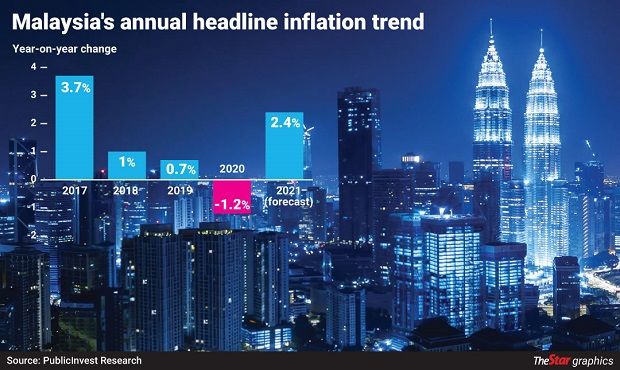Malaysia: Price pressure up
PETALING JAYA: Consumers may need to brace for higher price pressures in the second half of the year, even as the economy continues to struggle due to weak growth prospects.
While the electricity bill discount from July to December 2021 would help to somewhat soften the squeeze on consumers’ pockets, economists said inflationary pressure would emerge from elevated crude oil prices and higher global food prices, among others.According to AmBank Research, led by its chief economist Anthony Dass,(pic below) there are chances of manufacturers transfering some of the price hike to consumers.
“Our focus will be on the producer price and input cost of manufactures as these will determine the possibilities of transfer pricing,” it said in a note yesterday.
When contacted by StarBiz, Dass said the disruptions in supply chain and logistics, apart from the weak ringgit, would cause production costs to go up.
“So far, the manufacturers have been absorbing the extra costs. But, how long can they hold up? Eventually, it will be transferred to the consumers, especially once demand begins to exceed supply,” he said.
Going forward, AmBank Research pointed out that upward price pressure would also come from pent-up demand as the states transition into different phases of the National Recovery Plan.
“But the upside could be partially muted due to the low base number effect that has started to dissipate since May 2021.
“With inflation averaging at 2.3% in the first half of 2021, our full year forecast remains at 3% to 3.5% year-on-year (y-o-y),” the research house added.
Meanwhile, PublicInvest Research expects the consumer price index (CPI) to remain elevated until the end of 2021.
The CPI growth would taper and normalise thereafter, according to the research house.
Apart from the expected rise in crude oil prices, PublicInvest Research said a recovery in sentiment following the rapid Covid-19 vaccination programme would drive the CPI upwards.
“The CPI will also get a boost from the full implementation of eight fiscal stimulus packages worth RM530bil, equivalent to about 39% of gross domestic product.
“Private-public initiatives that will create 500,000 new employment this year will also bode well for the CPI.
“An accommodative interest rate environment will also be supportive of demand and therefore, the headline index.
“Inflation expectation remains anchored, thanks to unprecedented amount of fiscal aid and protracted period of accommodative interest rate environment,” it said.
PublicInvest Research also pointed out that financial transfers, wage subsidies programme, loan moratorium, and a cap on RON95 petrol and diesel prices would lift consumer sentiment.
While the economists anticipate price pressures to take a hit on consumer spending, it is generally expected that the pace of inflation would moderate in the coming months.
The CPI, which measures the headline inflation rate, had again grown at a slower pace of 3.4% y-o-y in June.
For comparison, the CPI grew by 4.4% in May and 4.7% in April.
CPI without fuel remained steady at 1.5% y-o-y in June, as compared to 1.6% y-o-y in May.
This segment covers all goods and services except unleaded petrol RON95, unleaded petrol RON97 and diesel.
Meanwhile, core CPI, which excludes most volatile items including fresh food and administered prices of goods and services, eased by 0.1 percentage points to 0.7% y-o-y.
TA Securities Research said the inflation rate could continue increasing this month, albeit at a moderate pace of 3.1% y-o-y, following expectations of lower growth of transportation cost.
“The retail fuel price has averaged at RM2.302 per litre in July 2021 versus RM2.282 per litre in June 2021 and RM1.845 per litre in July last year.
“That should translate to lower annual growth of 24.8% y-o-y versus 45.8% in the past two months.
“The rest of the CPI segments such as clothing and footwear, recreation services and culture, and restaurant and hotels are also assumed to remain muted in June, affected by lower demand, as people are still cautious during the full-lockdown period,” the research house said.
Kenanga Research said inflation rate may hover around 1% to 2% in the second half of the year as the low base effect starts to wear off, bringing the CPI to trend lower in the next few months.
This is amid the heightened Covid-19 uncertainty.
“At this point, we believe that Bank Negara will likely keep the overnight policy rate (OPR) unchanged at 1.75% for the rest of the year.
“Nonetheless, there is still room for Bank Negara to cut the OPR should the current unabated rise in Covid-19 infections lead to a further extension of the phase one restrictions in key economic states namely, Selangor and Kuala Lumpur, upending Malaysia’s growth prospects,” it added.
Source: https://www.thestar.com.my/business/business-news/2021/07/27/price-pressure-up


 Thailand
Thailand





